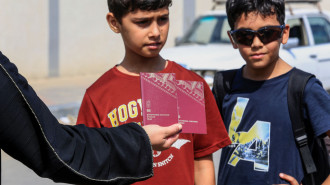Recalled after IRGC's ballistic missile attacks on Erbil, Iraq reinstates ambassador to Iran
The Iraqi ambassador to Iran, Nasir Abdul Mohsen, is set to return to Tehran "within the next few hours" to resume his duties. This move comes after approximately a month since Baghdad summoned him following the missile attacks carried out by Iran's Revolutionary Guards on Erbil, the capital city of the Iraqi Kurdistan region.
The Iraqi government instructed the Iraqi ambassador in Tehran, Nasir Abdul Mohsen, to return to carry out his regular duties at the Iraqi embassy in Iran, two diplomatic officials in the Iraqi Ministry of Foreign Affairs in Baghdad on Monday revealed to Al-Araby Al-Jadeed, The New Arab's Arabic sister website.
One of the officials who spoke anonymously said that Abdul Mohsen would leave for Tehran within the next two days. Still, the other official have said the move will happen "within hours," indicating that the ambassador's return coincides with a series of security agreements between Iraq and Iran, including Iranian commitments to "respect Iraq's sovereignty."
The Iraqi Ministry of Foreign Affairs, on 16 January, summoned its ambassador to Iran to Baghdad for consultation following Iran's missile attacks on Erbil.
Late on 15 January, the Islamic Revolutionary Guard Corps (IRGC) launched a barrage of ballistic missiles toward Erbil, claiming it hit a "Zionist regime's spy headquarters in northern Iraq" with the strike, but it did not provide any evidence. The Iraqi and Kurdish officials have refuted Iran's claims. The attacks killed four people, including two businessmen, and injured six others.
Peshraw Dizayi, a prominent local businessman and owner of Falcon Group companies and Empire World real estate, was killed in one of the strikes along with members of his family. Karam Mikhail, a British-Emirati businessman and owner of Al-Rayan Iraq Company, was also killed in the attack on Dizayi's house outside Erbil.
Iraq's foreign ministry on 17 January stressed it would take all legal measures, including filing a complaint with the UN Security Council. However, no comments from the government regarding the complaint have been issued, and the UN Security Council has not announced receiving any complaint from Iraq on this matter.
As of the preparation of this news story, Iraq's foreign ministry has not issued any official stance regarding the reinstatement of its ambassador to Tehran.
"Baghdad's reaction to both Iranian and repeated American attacks was mainly aimed at maintaining its image in front of the Iraqi public, without any international or practical impact," Iraqi political affairs researcher Ahmed Al-Naimi told the website.
Al-Naimi added that all measures announced by the Iraqi government after missile attacks on Erbil "have not been met with any corresponding action from Tehran, as happened between Iran and Pakistan, for example. This confirms an Iranian understanding that Iraqi steps or statements have internal calculations sought by the Iraqi Prime Minister Mohammed Shia al-Sudani's government and the ruling coalition to appear independent in front of the Iraqi public."
He also contextualised the situation within the framework of Turkish airstrikes, noting that the current state of affairs in Iraq does not permit internal or military responses to the infringements it faces from Iran, Turkey, and the United States.




 Follow the Middle East's top stories in English at The New Arab on Google News
Follow the Middle East's top stories in English at The New Arab on Google News
![People gathered around the rubble of destroyed houses to search for survivors [Getty]](/sites/default/files/styles/image_330x185/public/2024-11/GettyImages-2184733820.jpg?h=199d8c1f&itok=NiM1LO2f)

